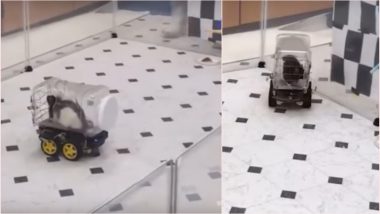If you are someone who absolutely adores Stuart Little, prepare yourselves for some real-life adventure of rats. Scientists are reportedly training rodents to drive tiny electric cars to help them reduce their stress levels. The researchers at the University of Richmond in the United States taught a group of about 17 rats to drive little plastic cars. The study found that the little ones left more relaxed during the task, and further findings could help in the development of non-pharmaceutical treatments for mental illness. A viral video capturing the session shows how these Stuart Littles were taught driving by the scientists. Monkeys Are Feeding on Rats in Malaysia! Scientist Shocked But Call Them 'Effective Pest Control'.
Professor of Behavioural Neuroscience, Kelly Lambert and her research colleagues, created small "cars" made from clear plastic containers. The cars’ floors were made of aluminium, and they had three copper bars that acted as wheels. “The rat is an appropriate model for the human brain in many ways since it has all the same areas and neurochemicals as the human brain — just smaller, of course. Although humans are more complex than rats, we look for ‘universal truths’ about how brains interact with environments to maintain optimal mental health,” Lambert was quoted in The Washington Post report. ‘There’s a Rat in the Toilet’: How a Twitter User Made Everyone Realise They Had THIS Primal Fear.
Watch Viral Video:
How Did Rats learn to Drive?
As explained in the same report, a copper wire was threaded horizontally across the jar, to form three bars, left, right and centre. To drive the car, a rat would sit on the aluminium plate and touch the copper wire. The circuit is complete, and the tiny rats could select the direction in which they wanted to travel. Researchers further note that after months of training, the rats learned how to make the vehicles move and also to change direction.
A total of 17 rats were part of the study. Some of them were raised in a lab, while others lived in ‘enriched environments.’ The rats who lived in the enriched environment were proved to be better at driving than the lab-raised rodents. After the trials were over, scientists collected the rats’ faeces that showed increased levels of dehydroepiandrosterone (DHEA), the hormone that thwarts stress. And the rats who were driving the cars appeared to be less stressed than the rats who are passengers in remotely controlled versions.
(The above story first appeared on LatestLY on Oct 25, 2019 04:03 PM IST. For more news and updates on politics, world, sports, entertainment and lifestyle, log on to our website latestly.com).













 Quickly
Quickly




















